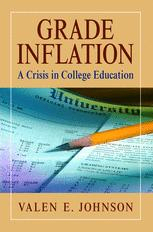April, 2011 archive
Why Are Students Not Learning? 0
By Thomas H. Benton
Lack of student preparation. Increasingly, undergraduates are not prepared adequately in any academic area but often arrive with strong convictions about their abilities. So college professors routinely encounter students who have never written anything more than short answers on exams, who do not read much at all, who lack foundational skills in math and science, yet are completely convinced of their abilities and resist any criticism of their work, to the point of tears and tantrums: “But I earned nothing but A’s in high school,” and “Your demands are unreasonable.” Such a combination makes some students nearly unteachable.
Grade inflation. It has become difficult to give students honest feedback. The slightest criticisms have to be cushioned by a warm blanket of praise and encouragement to avoid provoking oppositional defiance or complete breakdowns. As a result, student progress is slowed, sharply. Rubric-driven approaches give the appearance of objectivity but make grading seem like a matter of checklists, which, if completed, must ensure an A. Increasingly, time-pressured college teachers ask themselves, “What grade will ensure no complaint from the student, or worse, a quasi-legal battle over whether the instructions for an assignment were clear enough?” So, the number of A-range grades keeps going up, and the motivation for students to excel keeps going down.
Student retention. As the college-age population declines, many tuition-driven institutions struggle to find enough paying customers to balance their budgets. That makes it necessary to recruit even more unprepared students, who then must be retained, shifting the burden for academic success away from the student and on to the teacher. Faculty members can work with an individual student, if they have time, but the capabilities of the student population as a whole define the average level of rigor that is sustainable in the classroom. At some institutions, graduation rates are so high because the academic expectations are so low. Failing a lot of students is a serious risk, financially, for the college and the professor.
Student evaluations of teachers. Although a lot of emphasis is placed on research on the tenure track, most faculty members are not on that track and are retained on the basis of what students think of them. The common wisdom, for the untenured, at least whether it is true or not is to find ways to keep the students happy: Expect little, smile a lot, gesture freely, show movies, praise them constantly, give high marks, bring cookies on evaluation day. Wise administrators may read confidential evaluations in context, but students can now use the Internet to retaliate against professors in ways that can damage their ability to sustain minimal enrollments in their classes.
 Enrollment minimums. Students gravitate to lenient professors and to courses that are reputedly easy, particularly in general education. Some students may rise to a challenge; many won’t. They’ll drop, withdraw, or even leave a college that they find too difficult. If you are untenured and your courses do not attract enough students, then you can become low-hanging fruit for nonrenewal. If you are tenured, then it means being “demoted” to teach service courses. In such contexts, the curriculum populated by electives and required courses competing for the lowest expectations is driven increasingly by student demand rather than by what a community of scholars believes undergraduates should know.
Enrollment minimums. Students gravitate to lenient professors and to courses that are reputedly easy, particularly in general education. Some students may rise to a challenge; many won’t. They’ll drop, withdraw, or even leave a college that they find too difficult. If you are untenured and your courses do not attract enough students, then you can become low-hanging fruit for nonrenewal. If you are tenured, then it means being “demoted” to teach service courses. In such contexts, the curriculum populated by electives and required courses competing for the lowest expectations is driven increasingly by student demand rather than by what a community of scholars believes undergraduates should know.
Lack of uniform expectations. It is impossible to maintain high expectations for long unless everyone holds the line in all comparable courses and we face strong incentives not to do that. A course in which the professor assigns a 20-page paper and 200 pages of reading every week cannot compete with one that fills the same requirement with half of those assignments. Faculty members cannot raise expectations by themselves, nor can departments, since they, too, are competing with one another for enrollments.
